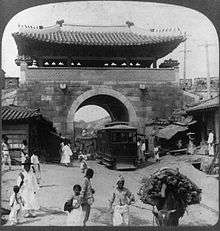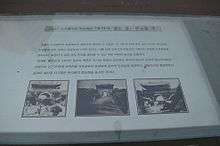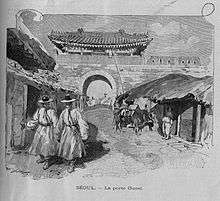Donuimun
Coordinates: 37°34′05.68″N 126°58′08.31″E / 37.5682444°N 126.9689750°E
| Donuimun | |
| Hangul | 돈의문 |
|---|---|
| Hanja | 敦義門 |
| Revised Romanization | Donuimun |
| McCune–Reischauer | Tonŭimun |
Donuimun (Hangul 돈의문, Hanja 敦義門; also known as West Gate) was one of the Eight Gates of Seoul in the Fortress Wall of Seoul, South Korea, which surrounded the city in the Joseon Dynasty. The gate’s historical location is also known as Seodaemun (서대문, “West Big Gate”).
History
Donuimun was originally built in 1396. It was burned as a result of the 16th century invasions by Japan, but was rebuilt in 1711.[1] In 1413(King Tajo 13),the gate was closed. In 1422(King Sejong 4)Donuimun gate was repaired. In 1711(King Sukjong 37)Donuimun Gate was rebuilt in 1711.[2] In 1915, the gate was again destroyed during the Japanese colonial period. The gate was photographed at various times before its destruction, most notably by in a series of photographs taken by Presbyterian missionary Horace Grant Underwood in 1904. Some of these photographs show the tracks of an "American Electric Tramway" running through the gate.
The name Donuimun means literally “Loyalty Gate.”[3] It was one of the Four Great Gates (사대문) in the Fortress Wall of Seoul.
The Gate today
Donuimun no longer exists now. In 2009, The Chosun Ilbo newspaper reported that the city of Seoul had announced a plan to rebuild the gate by 2013 and expand sections of the historical Fortress Wall in which it was located.[4] However, those plans was difficult to running longer because the issues such as the budget and its original form restoration. Thus, the plan was delayed to long-term project until 2022.[5]
Visitors to the site of the former gate today will find a memorial in its place (see picture below).
Images
| Donuimun, as photographed in 1904 by Horace Grant Underwood. |  Donuimun Gate, Seoul, Korea |
| Donuimun Memorial, May 2012. |  Donuimun Gate Memorial, Seoul, Korea |
| Donuimun Signboard, as represented on the current memorial. |  Donuimun Signboard, Seoul, Korea |
| Back of Donuimun Memorial, May 2012. |  Donuimun Gate Memorial Back, Seoul, Korea |
| Signage from back of Donuimun Memorial, May 2012. |  Donuimun Gate Memorial Signage, Seoul, Korea |
| Donuimun sketch, ca. 1894. |  Donuimun sketch, Seoul, Korea |
References
- ↑ "Seoul City to Restore Ancient West Gate". Chosun Ilbo.
- ↑ "travel2seoul". Retrieved 1 December 2014.
- ↑ "The Gates and Walls of Seoul". Korean News Today.
- ↑ "Seoul City to Restore Ancient West Gate". Chosun Ilbo.
- ↑ 日帝가 허문 ‘돈의문’ 복원 불투명 (in Korean). Munhwa Ilbo. 2012-12-10. Retrieved 2013-04-30.
| ||||||||||